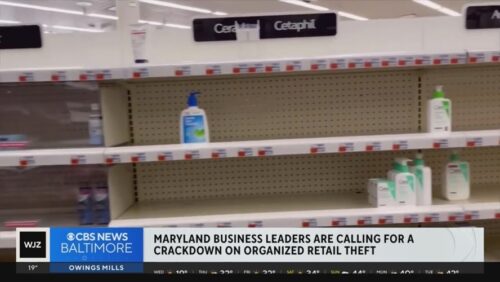
1.21.25 – CBS Baltimore- By JT Moodee Lockman, Ashley Paul
Maryland business leaders and advocates are pushing lawmakers to pass a bill that would crack down on organized retail theft and hold offenders accountable.
Maryland business leaders and advocates are pushing lawmakers to pass a bill that would crack down on organized retail theft and hold offenders accountable.
The Organized Retail Theft Act introduced in the General Assembly defines the crime as a series of thefts from one or more retailers over 90 days with a retail value of at least $1,500.
“This is starting to become the norm. This is something that is not normal, this is something that we will not accept,” said Prince George’s County Sheriff John Carr.
Organized retail theft would be a felony under the proposed bill, with penalties varying based on the value of the stolen items.
- If the value of the stolen property is between $1,500 and $25,000, a maximum sentence of five years could be imposed.
- If the value of the stolen property is between $25,000 and $100,000, a maximum sentence of 10 years could be imposed.
- If the value of the stolen property is $100,000 or more, a maximum sentence of 20 years could be imposed.
A person convicted of organized retail theft would also have to return the stolen property or pay the full value to the retailer.
Under the proposed bill, separate organized crime offenses carried out by the same person could be prosecuted together in any of the counties in which the offenses occurred.
The bill would also allow a court to decide if a certain crime should be considered organized retail theft.
“The reality of retail theft, crime in our county, people sometimes don’t understand the victims, and what I would say to you is the victims are us,” said Derrick Leon Davis, economic development advisor.
A similar bill was introduced in 2024 but stalled in the Senate.
For and against organized retail theft bill
The Office of the Public Defender argues a bill like this would allow prosecutors to allege a scheme with a lower stand of proof.
They said in a statement to WJZ, “What this bill seeks to do is infringe on accused individuals’ rights to sever charges, provide a defense, and challenge jurisdiction.”
But those in favor of the bill say it’s common sense to hold these criminals responsible for their repeat offenses.
“We believe that we must sweep across the county to make sure that things like catching criminals — criminals, whether it’s misdemeanors or felons — criminals who steal from our shops and facilities, land where they need to be,” Davis said.
Business owners speak out
The Greater District Heights Community Coalition (GDHCC) is pushing for lawmakers to pass the bill to strengthen protections for businesses and improve community safety.
The GDHCC, along with the Maryland Retailers Alliance, and other advocates, held a news conference Tuesday to share firsthand accounts of how the proposed legislation could help in the fight against organized retail crime.
They say more theft means less inventory available, higher prices on the remaining inventory to make up for the loss, and stores closing up shop, which in turn means fewer jobs.
“It hurts because it leads to higher prices, it hurts because it limits access, availability or goods and merchandise that is surely needed, and it causes our residents to be fearful for their own personal safety at times,” said Pastor Bobby Williams, from St. Paul Church in District Heights.
Rise in retail theft
Retail theft has increased across the U.S. and in Maryland. According to an October 2024 report from Capital One Shopping’s Research team, retailers in Maryland lost about $1.403 billion in revenue to theft in 2022.
Some retailers have started to take action against theft. In May 2024, Giant Food enacted a ban on large bags at some locations to fight “unprecedented levels” of theft. The Giant store in Baltimore’s Waverly neighborhood was one of many locations to implement the ban.
In August, two Giant grocery stores in Baltimore banned shoppers younger than 17 from entering the store unsupervised after 6 p.m.
In a statement, Giant said they initiated the policy at select stores that “are experiencing high shrink to mitigate the unprecedented levels of product theft that have become unsustainable.”
According to Capitol One’s report, retail theft per capita in Maryland is about 15% lower than the average among U.S. states.
In November, Maryland Attorney General Anthony Brown spoke out against organized retail crime after four men were indicted for their involvement in retail burglaries across six counties.
“Organized retail crimes are not victimless. Stealing hundreds of thousands of dollars from businesses can lead to higher prices for products that Marylanders need, and cost hardworking employees their jobs,” AG Brown said.
